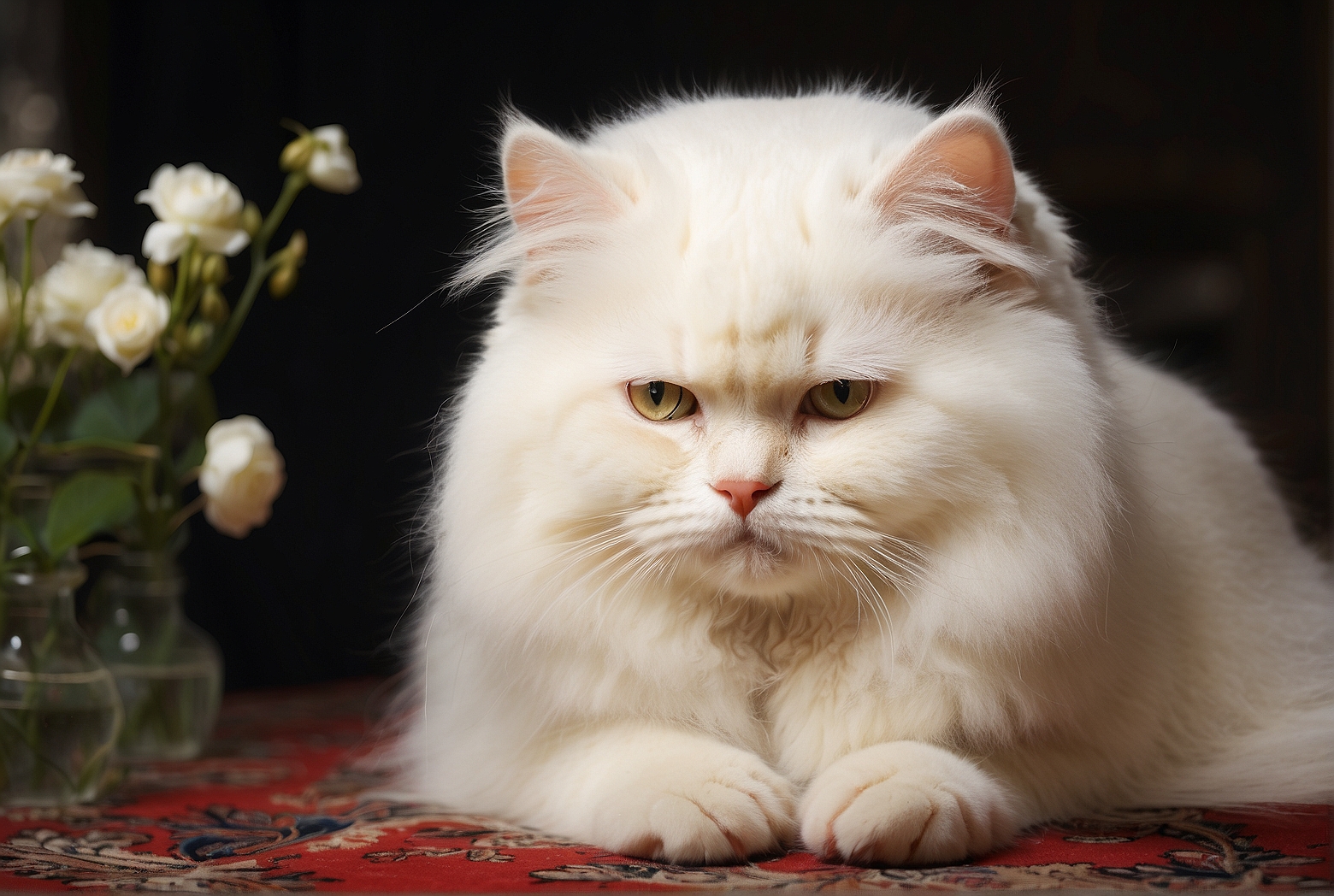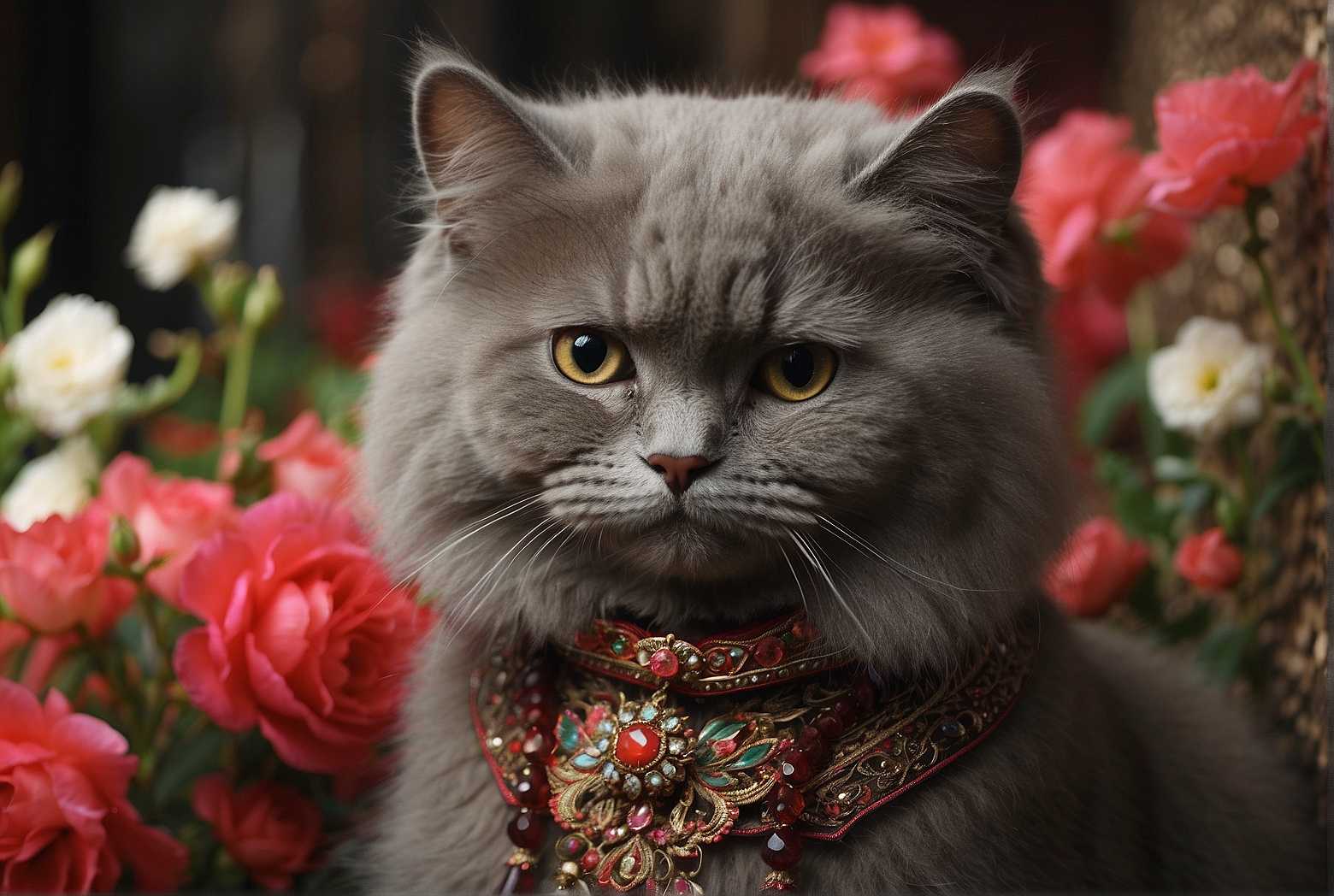If you have ever considered getting a Persian cat as a pet, you may find yourself wondering if these gorgeous creatures are sensitive to vaccines. With their luxurious and dense fur, stunning almond-shaped eyes, and calm demeanor, Persians are undeniably captivating. However, when it comes to their health, it’s crucial to know if they have any special considerations, particularly when it comes to vaccinations. In this article, we will explore whether Persians are sensitive to vaccines, providing you with important insights about these majestic cats’ well-being.
Understanding Persian Cats
Persian cats are known for their unique and beautiful appearance. With their long, luxurious coats and distinctive flat faces, these feline companions command attention wherever they go. Understanding the physical characteristics, temperament, and potential health issues of Persian cats is essential for providing them with the best possible care.
Physical Characteristics
One of the most notable features of Persian cats is their long, flowing coat. This luxurious fur requires regular grooming to prevent matting and keep it in top condition. Persian cats also have distinctively large, round eyes and a flat face, which contribute to their adorable and sometimes pouty expression. Their stocky build and short legs give them a charming and distinctive appearance.
Temperament
Persian cats are known for their calm and gentle nature. They typically prefer a peaceful and quiet environment, making them ideal companions for individuals or families who value a relaxed and peaceful lifestyle. These cats enjoy spending time indoors and are content to laze around and enjoy your company. While they may not be as playful and energetic as some other breeds, they make up for it with their affectionate and loving demeanor.
Health Issues
Unfortunately, Persian cats are prone to some health issues that are important to be aware of. One common issue is their susceptibility to respiratory problems due to their flat faces. Additionally, their long coat requires regular grooming to prevent matting and skin problems. Persian cats also have a higher risk of developing polycystic kidney disease, a genetic condition that can lead to kidney failure. Regular veterinary check-ups and attention to their unique needs are crucial for keeping Persian cats healthy and happy.
The Importance of Vaccines
Vaccines play a vital role in protecting our feline friends from various infectious diseases. By stimulating the immune system to recognize and fight off specific pathogens, vaccines help prevent illnesses that could be severe or even life-threatening for cats. It is crucial to understand the benefits of vaccination, the common vaccines recommended for cats, and the appropriate vaccine schedule for Persian cats.

Benefits of Vaccination
Vaccination provides several important benefits for cats. Firstly, it helps prevent the spread of contagious diseases within feline populations. By vaccinating your Persian cat, you not only protect them but also contribute to the overall health and well-being of the entire feline community. Vaccines can significantly reduce the likelihood of your cat contracting serious illnesses, such as feline viral rhinotracheitis, calicivirus, panleukopenia, and rabies. Additionally, vaccines can potentially lessen the severity of the disease if a vaccinated cat does become infected.
Common Vaccines for Cats
There are several vaccines recommended for cats, and some are considered essential for their well-being. The core vaccines for felines include the FVRCP vaccine, which protects against feline viral rhinotracheitis, calicivirus, and panleukopenia. Rabies vaccination is also crucial and often required by law. Non-core vaccines, such as those for feline leukemia virus (FeLV), are recommended based on a cat’s individual risk factors, lifestyle, and local prevalence of the disease.
Vaccine Schedule for Cats
The vaccine schedule for Persian cats is typically determined by their age and risk factors. Kittens generally receive a series of vaccines starting around 8-9 weeks of age and continuing every 3-4 weeks until they are 16-20 weeks old. Boosters are then administered annually or according to the specific vaccine’s recommended schedule. It’s important to work closely with your veterinarian to determine the appropriate vaccination schedule for your Persian cat based on their individual needs and lifestyle.
Are Persian Cats More Sensitive to Vaccines?
One common concern among Persian cat owners is whether these feline companions are more sensitive to vaccines compared to other breeds. While there is limited research specifically on Persian cats and vaccine sensitivity, it’s essential to consider potential sensitivity factors, review available studies, and be aware of any adverse reactions that may occur.
Potential Sensitivity Factors
Various factors can contribute to an individual cat’s sensitivity to vaccines, regardless of their breed. Persian cats, due to their unique physiology, may be more prone to respiratory issues and may have a higher risk of vaccine reactions that affect their airways. Additionally, genetic factors and overall health can play a role in an individual cat’s response to vaccines.
Research and Studies
Although there is limited research focused specifically on Persian cats and vaccine sensitivity, studies on vaccine reactions in cats as a whole provide valuable insights. These studies suggest that certain breeds, including Persians, may be more likely to experience adverse reactions following vaccinations. However, it’s important to note that adverse reactions are generally rare, and the benefits of vaccination typically outweigh the risks.

Persian Cats and Adverse Reactions
Like any other breed, Persian cats can experience adverse reactions to vaccines. These reactions can range from mild symptoms, such as local swelling or discomfort at the injection site, to more severe reactions like allergic responses. It’s crucial to monitor your Persian cat closely after vaccination and report any concerning symptoms to your veterinarian promptly. With proper monitoring and by working closely with your veterinarian, any potential risks can be minimized.
Tips for Vaccinating Persian Cats
When it comes to vaccinating your Persian cat, there are several tips to keep in mind to ensure their safety and well-being. By consulting with a veterinarian, considering genetic factors, choosing the right vaccine type, monitoring for side effects, and providing appropriate post-vaccination care, you can help make the vaccination experience as smooth as possible for your feline companion.
Consult with a Veterinarian
Before vaccinating your Persian cat, it’s essential to consult with a knowledgeable veterinarian. They can guide you in determining the appropriate vaccines, vaccine schedule, and any precautions or considerations specific to your Persian cat’s health and lifestyle. Veterinarians can also address any concerns or questions you may have, ensuring that you make informed decisions regarding your cat’s vaccination needs.
Consider Genetic Factors
As mentioned earlier, genetic factors can influence a cat’s response to vaccines. When discussing vaccination with your veterinarian, it’s important to provide information about your Persian cat’s genetic background, as well as any known health issues within their lineage. This information can help your veterinarian tailor the vaccination approach to minimize potential risks.
Choosing the Right Vaccine Type
There are different types of vaccines available for cats, including modified live virus (MLV) vaccines and killed/inactivated vaccines. Some vaccines are administered as a single dose, while others require a series of injections. Your veterinarian will consider your Persian cat’s individual needs and risk factors when selecting the appropriate vaccine type and formulation.
Monitoring for Side Effects
After vaccination, it’s crucial to monitor your Persian cat for any potential side effects. Common post-vaccination reactions may include mild lethargy, temporary loss of appetite, or slight swelling at the injection site. However, it’s important to be vigilant for more severe symptoms, such as difficulty breathing, vomiting, diarrhea, or a severe allergic reaction. If you notice any concerning symptoms, contact your veterinarian immediately.
Post-Vaccination Care
Providing appropriate post-vaccination care can further support your Persian cat’s well-being. Ensure they have a comfortable and stress-free environment to recover in. Monitor their eating, drinking, and bathroom habits to ensure they return to their normal routine. If your veterinarian recommends any specific care instructions, such as limiting physical activity or avoiding contact with other animals, it’s crucial to follow these guidelines to protect your cat’s health.
Minimizing Vaccination Risks for Persian Cats
While vaccination is generally considered safe for cats, there are measures that can be taken to minimize potential risks, especially for sensitive breeds like Persian cats. By following pre-vaccine precautions, considering split vaccine administration, using allergic reaction medications, and exploring alternate immunization routes, you can further reduce the likelihood of adverse reactions.
Pre-Vaccine Precautions
Before your Persian cat receives any vaccinations, it’s important to ensure they are in good overall health. If your cat is currently ill, exhibiting any symptoms, or recovering from surgery, it may be necessary to delay vaccinations until they have fully recovered. Similarly, if your Persian cat has a history of adverse reactions to vaccines or any other medications, you should discuss this with your veterinarian to assess the best approach for vaccination.
Split Vaccine Administration
For cats, including Persian cats, who may be more prone to vaccine sensitivity, split vaccine administration can be considered. This involves dividing the vaccine doses into smaller amounts and administering them over multiple visits. This approach allows for a more gradual stimulation of the immune system, potentially reducing the likelihood of adverse reactions.
Use of Allergic Reaction Medications
In cases where a Persian cat has a known history of vaccine sensitivity or is considered high-risk, your veterinarian may recommend pre-medication with antihistamines or other medications to reduce the chances of an allergic reaction. This approach should only be used under veterinary guidance and if the potential benefits outweigh any potential risks.
Alternate Immunization Routes
In some situations, alternate immunization routes, such as intranasal or oral vaccines, may be considered for Persian cats. These routes bypass the traditional injection method and can reduce the chance of adverse reactions. However, it is important to note that not all vaccines have alternate routes available, and the decision to use them should be based on individual risk assessments and veterinary recommendations.
Alternative Approaches to Vaccination for Persian Cats
While traditional vaccination is the standard approach to disease prevention in cats, some alternative methods have been explored. These include titers testing, homeopathic vaccines, and natural immunity boosters. It’s important to note that these approaches may have limitations and varying degrees of scientific evidence supporting their efficacy.
Titers Testing
Titers testing is a method of measuring the antibody levels in a cat’s blood to determine their immunity to specific diseases. This testing assesses whether a cat has a sufficient immune response to a previous vaccination or if revaccination is necessary. This approach can be an alternative for Persian cats who are deemed at higher risk for vaccine reactions. However, it’s essential to consult with a veterinarian and consider the local regulations and requirements regarding vaccination.
Homeopathic Vaccines
Homeopathic vaccines, also known as nosodes, are derived from diluted and succussed substances related to specific diseases. They are typically administered orally or as nasal sprays. Advocates of homeopathic vaccines believe they can stimulate the immune system without the potential risks associated with traditional vaccines. However, it’s important to note that scientific evidence supporting the efficacy of homeopathic vaccines in preventing diseases in cats is limited, and they may not be accepted as a substitute for standard vaccination by all veterinarians and regulatory bodies.
Natural Immunity Boosters
Certain supplements and natural remedies are believed to help strengthen a cat’s immune system and overall health. These include ingredients like herbs, antioxidants, and omega-3 fatty acids. While incorporating these natural immunity boosters into your Persian cat’s diet or routine may have some benefits, they should not replace vaccinations. It’s important to remember that vaccines are specifically designed to provide immunity against specific diseases and are the most effective method of disease prevention.
The Role of Breeders in Vaccinating Persian Cats
Responsible breeders play a significant role in the health and well-being of Persian cats. When adopting a Persian kitten, it’s important to choose a reputable breeder who follows proper vaccination protocols, maintains accurate vaccination records, and communicates effectively with adopters about the vaccination status and requirements.
Responsible Breeder Practices
Reputable breeders prioritize the health of their cats and kittens. They work closely with veterinarians to ensure their cats are appropriately vaccinated from an early age. They maintain detailed vaccination records, providing adopters with essential information about the vaccinations already given and those still required. Responsible breeders also educate adopters about the importance of continued vaccinations and the potential risks and benefits associated with them.
Vaccination Status and Documentation
When adopting a Persian cat from a breeder, it’s crucial to inquire about the cat’s vaccination status and obtain valid documentation. This documentation should include information about the vaccines administered, the dates of administration, and any recommended future vaccinations. This allows you and your veterinarian to continue the vaccination schedule and monitor your Persian cat’s health effectively.
Communication with Adopters
Responsible breeders understand the importance of ongoing communication with adopters. They provide guidance on vaccination protocols, answer any questions or concerns, and offer support throughout the vaccination process. Their open and honest communication helps create a collaborative environment, ensuring that Persian cats receive the best possible care.
Common Misconceptions about Vaccinating Persian Cats
When it comes to vaccinating Persian cats, there are several common misconceptions that need to be addressed. Distinguishing between vaccine sensitivity and breed sensitivity, dispelling vaccine myths, and understanding the facts surrounding feline vaccinations is crucial for making informed decisions about your Persian cat’s health.
Vaccine Sensitivity vs. Breed Sensitivity
It’s essential to differentiate between vaccine sensitivity and breed sensitivity. While certain breeds, including Persian cats, may be more prone to adverse reactions following vaccination, it does not mean that every cat of that breed will experience sensitivity. Each cat is an individual, and factors such as overall health, genetics, and previous reactions play significant roles in determining their response to vaccines. It’s crucial to assess each cat’s unique circumstances rather than assuming all Persian cats will have vaccine sensitivity.
Vaccine Myths and Facts
Misinformation surrounding vaccines can lead to confusion and unnecessary concerns. It’s important to rely on accurate and reputable information from veterinarians and scientific studies when understanding the risks and benefits of vaccination for Persian cats. Vaccines have been extensively tested and proven to significantly reduce the occurrence and severity of many potentially life-threatening diseases in cats. The benefits of vaccination outweigh the minimal risks associated with it.
Conclusion
When it comes to vaccinating Persian cats, taking an individualized approach is key. Understanding their physical characteristics, temperament, and potential health issues helps provide the best care possible. Vaccines are an essential tool in protecting Persian cats from infectious diseases, and while they may be more prone to adverse reactions, with proper precautions and monitoring, any risks can be minimized. Working closely with a veterinarian, considering genetic factors, and maintaining open communication with responsible breeders are all important steps in ensuring the well-being and health of Persian cats. Balancing the risks and benefits of vaccination, while considering alternative approaches when appropriate, is crucial for providing the best possible protection for these beloved feline companions.
